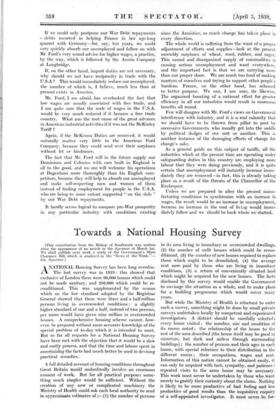Sir Herbert Austin.
IWAS much interested to read the interview with Mr. Henry Ford on British unemployment, because I like to think of him as a friend, and I have a great admiration for the wonderful results that he and his staff have accomplished during the pait twenty years.
In general, I am in agreement with his views, but would join issue with him on one or two points. First, as to the cause of this unemployment.
While higher wages would undoubtedly increase trade and, therefore, employment, that is not the cause of the present state of affairs. We are suffering from the effects of disorganization chiefly as a result of the War, and we are only very gradually getting out of the mess. It is so often forgotten that the cream of our manhood disappeared during the War—the very men in many cases who should at this moment be carrying on the prestige and burden of the responsibility of the country are not here, they vanished out of the picture when their relatives in the U.S.A. were deciding as to whether they should come in or stay out.
I admit that some of us are moving more slowly than we ought to, but so are some of our competitors in the U.S.A., and in their case they are much more to blame. As a proof of this, we see that many of their industries are petitioning their Government for an increase in their already high import duties. If we could only postpone our War Debt repayments —debts incurred in helping France in her age-long quarrel with Germany—for, say, ten years, we could very quickly absorb our unemployed and follow on with Mr. Ford's very sound advice for higher wages, a practice, by the way, which is followed by the Austin Company at Longbridge.
If, on the other hand, import duties are not necessary, why should we not have reciprocity in trade with the U.S.A ? This Would immediately reduce our unemployed, the number of which is, I believe, much less -than at present exists in America. . - Mr. Ford, I am afraid, has overlooked the fact that low wages are usually associated with free trade, and I am quite sure that the scale of wages in the U.S.A. would be very much reduced if it became a free trade country. What was the root cause of the great advance in American industrial activities if it was not the McKinley Tariff ?
Again, if the McKenna Duties are removed, it would naturally matter very little to the American Ford Company, because they could send over their surpluses without let or hindrance.
The fact that Mr. Ford will in the future supply our Dominions and Colonies with cars built in England is all to the good, and no one will welcome his operations at Dagenham more thoroughly than his English com- petitors, because they will help to absorb our unemployed and make self-respecting men and women of them instead of finding employment for people in the U.S.A. who are being to some extent supported " on the dole " by our War Debt repayments.
It hardly seems logical to compare pre-War prosperity in any particular industry with conditions existing since the Armistice, so much change has taken place in every direction.
The whole world is suffering from the want of a proper adjustment of efforts and supplies—look at the present unwieldy surpluses of wheat, wool, rubber, and sugar. This casual and disorganized supply of commodities is causing serious unemployment and want everywhere, and the important fact is that we are carrying more than our proper share. We are much too fond of making martyrs of ourselves and trying to support other people's burdens. France, on the other hand, has schemed to better purpose. We can, I am sure, do likewise. The organized boosting of- a national effort for greater efficiency in all our industries would result in enormous benefits all round. • Few will disagree with Mr. Ford's views on Government interference with industry, and it is a real calamity that we should have to be thrown from pillar to post by successive Governments who- usually get into the saddle by political dodges of one sort or another. This is another instance of the damaging effects of change for change's sake.
As a general guide on this subject of tariffs, all the industries which at the present time are operating under safeguarding duties in this country are employing more labour that they were doing previously, and it is quite certain that unemployment will instantly increase imme- diately they are removed—in fact, this is already taking place as a result of the threats of the Chancellor of the Exchequer.
Unless we are prepared to alter the present manu- facturing conditions to synchronize with an increase in wages, the result would be an increase in unemployment, because an increase in the cost of living would imme- diately follow and we should be back where we started.











































 Previous page
Previous page